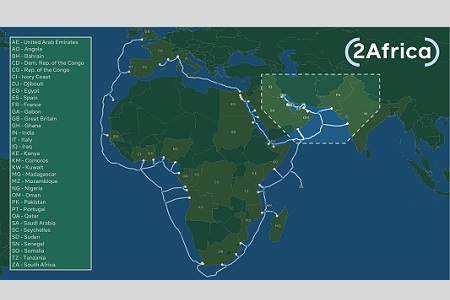 The 2Africa consortium, comprised of China Mobile International, Facebook, MTN GlobalConnect, Orange, STC, Telecom Egypt, Vodafone and WIOCC, has announced the addition of a new segment – the 2Africa PEARLS branch – extending to the Arabian Gulf, India, and Pakistan.
The 2Africa consortium, comprised of China Mobile International, Facebook, MTN GlobalConnect, Orange, STC, Telecom Egypt, Vodafone and WIOCC, has announced the addition of a new segment – the 2Africa PEARLS branch – extending to the Arabian Gulf, India, and Pakistan.
This extension will bring the total length of the 2Africa cable system to over 45,000 kilometres, making it the longest subsea cable system ever deployed.
Now connecting three continents, Africa, Europe and Asia terrestrially through Egypt, 2Africa creates connectivity by adding vital landing locations in Oman (Barka), UAE (Abu Dhabi and Kalba), Qatar (Doha), Bahrain (Manama), Kuwait (Kuwait), Iraq (Al-Faw), Pakistan (Karachi), India (Mumbai), and a fourth landing in Saudi Arabia (Al Khobar). The new 2Africa branch joins recently announced extensions to the Canary Islands, Seychelles, Comoros Islands, Angola, and a new landing to south-east Nigeria.
As with other 2Africa cable landings, capacity will be available in PEARLS landings at carrier-neutral facilities or open-access cable landing stations on a fair and equitable basis, encouraging and supporting the development of a healthy internet ecosystem.
To further support a burgeoning global digital economy, the expanded system will serve an even wider range of communities that rely on the internet for services from education to healthcare, and businesses, providing economic and social benefits that come from increased connectivity. As announced in May 2020, 2Africa was planned to directly bring seamless international connectivity to 1.2bn people. Today, with 2Africa PEARLS, 2Africa will be providing international connectivity to an additional 1.8bn people – that’s 3bn people, representing 36% of the global population.
Alcatel Submarine Networks (ASN) will deploy the new system utilising new technologies such as SDM that allow the deployment of up to 16 fibre pairs, double that of older technologies and bringing greater and more cost-effective capacity.












Add Comment